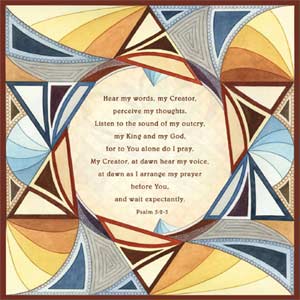Although only seven short verses, this psalm speaks powerfully to those facing crises or danger, for it was written in response to some kind of threat and danger. “In the Lord I take refuge; How can you say to my soul, ‘Flee as a bird to your mountain’” (v. 1).
We cannot know who this person or these people are who counsel flight, although we get some reason as to why they do so in verses two and three: the very foundations of society are being destroyed, and the wicked seem to be in the ascendancy. Although they slink about in darkness, they are armed and ready to shoot at the upright and bring them down. It seems there is nothing the upright can do in these circumstances except flee. Perhaps the counsel to flee comes from those concerned for the welfare of the psalmist. Perhaps it comes as a cynical admonition from those who sneer at his faith and think his defeat is imminent and irreversible. Either way, it is the counsel of despair: “Give up! Flee! Take cover! Save yourself; run for your life; seek safety elsewhere and let the city go to the dogs: there is nothing you can do.”
This is precisely what the psalmist refuses to do: “In the Lord I take refuge.” This bold statement recalls the promise of 2:12 that those who seek refuge in the Lord shall be blessed, even if the nations rage, and the “man of the earth” continues to enact terror (10:18).
What can the psalmist see that his counsellors cannot? “The Lord is in his holy temple; the Lord’s throne is in heaven” (v. 4). The psalmist is convinced that God is still on the throne, that God reigns, and so the events of earth are not beyond divine sovereignty and providence. God is neither absent nor uninvolved, but tests humanity, weighing the deeds both of the righteous and the wicked. Further, the psalmist believes that God exercises judgement, punishing the wicked and rewarding the righteous (vv. 6-7). This judgement is still future for the psalmist, but it is not necessarily eschatological (a judgement beyond the grave), but may in fact be historical. The wicked will in this life get their “just deserts,” while the righteous will receive God’s favour and be vindicated (cf. Craigie). It is possible, however, that the final phrase of the psalm, “the upright will behold his face,” may be understood in terms of the beatific vision promised to God’s people in the New Testament (see, for example, Revelation 22: 4).
Ultimately, then, the psalmist’s confidence is based upon faith. He trusts God because he trusts that the reality of God is more sure and more certain than the disintegrating chaos that surrounds him. This faith has several crucial aspects, which reflect the theological worldview of the ancient Hebrew people:
- First, God is utterly supreme, the transcendent ruler, lord and judge of all humanity;
- This God is moral, dwelling in his holy temple; he loves righteousness and so hates the one who loves violence (v. 5). The moral nature of God undergirds his activity as judge;
- In contrast to God, humanity is morally corrupt, and remains accountable to God who tests all people (vv. 4-5). Yet the possibility of being found among the righteous remains, and those who trust in God and practise righteousness will find that they are sheltered by God, and will “see” God’s face (v. 7);
- Judgement is certain, and there is a firm hope that ultimately, justice will be done, with the righteous being vindicated and blessed;
- How did the ancient Israelites know all this? By a conviction that this God had revealed himself to Israel throughout her history, and had called Israel into a covenant relationship with God. This knowledge and hope, assurance, courage, and moral vision are grounded in God’s revelation of himself and his will to his elect people.
The central question of the psalm is that put to the psalmist in verse three: if the foundations are destroyed, what can the righteous do? The psalmist seems to ignore the question, and instead directs his attention to the Lord who is in his holy temple (v. 4). Craigie (133) notes that this hints at the immanence of God: God is not simply transcendent and sovereignly powerful, but also present to comfort, help and support. There is no dualism here, no division of heaven and earth into separate compartments and spheres of rule. God’s throne is in heaven; God dwells in his temple. The same God is lord over all things, sovereignly powerful and yet close enough to shelter those who trust in him.
But is the psalmist evading the question? Perhaps not. For the psalmist, the Lord himself is the true foundation, the only foundation, an indestructible foundation upon which he can build his life and in whom he can trust. Social and cultural foundations may falter, people fail, institutions fade, and civilisations fall, but God remains steadfast. God himself and God alone is our only foundation—an unseen and intangible foundation, but no less real for all that.
What can the righteous do? They can do what the psalmist did: trust more deeply in God, and refuse to abandon their post. If we assume Davidic authorship of the psalm, we find here a leadership that refuses to capitulate in the face of desperate crisis. We find here a righteousness that refuses to hand over the city to the wicked. We find here a profound vision of faith in the sovereign goodness, presence and power of God—the true foundation upon which a life, a leader, and a city may be built. David stays because David trusts.

 Alex Jensen from Murdoch University was one of my supervisors for my doctoral studies and I owe him a great debt of gratitude for his friendship, support and expertise. I am pleased, therefore, to bring his new book to your attention: Divine Providence and Human Agency: Trinity, Creation and Freedom published by
Alex Jensen from Murdoch University was one of my supervisors for my doctoral studies and I owe him a great debt of gratitude for his friendship, support and expertise. I am pleased, therefore, to bring his new book to your attention: Divine Providence and Human Agency: Trinity, Creation and Freedom published by 
